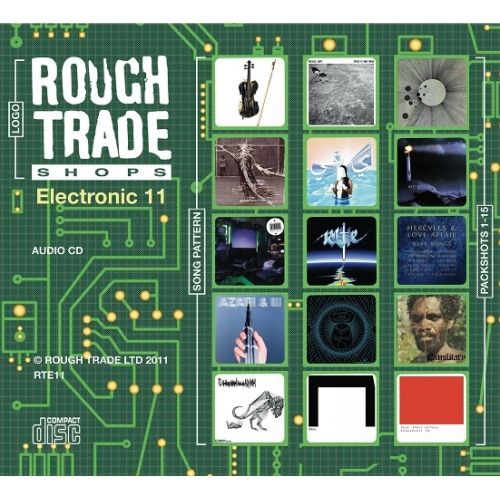It’s simple. If guitar music had a future, it would offer one. Discounting metal’s many incremental evolutions, with 20 years since shoegaze and grunge, guitar music has had ample time to produce another innovation; something unprecedented. But, as pop outsells rock for the first time in seven years; Pitchfork’s top-rated alt-rock records of last year sell a combined 214 units, and Chad Groening’s hair gets its own advice column, there’s an inkling that the great reinvention is, in fact, never coming. Electronic 11 suggests the folk at Rough Trade are getting that sinking feeling too. Electronica in 2011, on the other hand, sounds different from electronica in 2010, or that of any other year, as it happens. This is what they mean by progress, new-ness; the future.
One trend emerging in the underground involves the application of dance and bass-music beats to ‘high art’ music forms; stuff like conceptual sound art, avant garde chamber music, musique concrete etc. Described by Wire as "Arvo Pärt meets Trent Reznor", Ben Frost makes a showing with ‘O God Protect Me’, the sound of a hospital respirator breathing over hydraulic clacks and punctuated by spare sub bass; the impression being of an advancing, inescapable silence (imagine Portishead’s ‘Threads’ without all those heart-warming extras). Rene Hell’s ‘Oxford Meter End’, meanwhile, is a thicket of signifiers, beginning with Aphex-like cluster-beats, segueing into ribbons of ambient and plucked strings, and finishing with randomised Atari beeps. Then there’s Pansonic’s disturbing cry from digi-hell (‘Frankie Teardrop’ vs. Fennesz), Ayshay’s digitalisation of Islamic religious songs and Ekoplekz’s ‘Critical Condition’, described on the sleeve notes as a "hallucinatory tone-scrub". Not sure what that means, but the description fits. Elsewhere, other pioneering statements include Nicolas Jaar’s singular ‘Space Is Only Noise If You Can See’, Prurient’s death metal spin on digipunk (‘A Meal Can Be Made’) and Alva Noto’s rhythmic turbo-charging of Wolf Eyes-style noise, with ‘Uni Deform’.
In case the above sounds as appealing as a rolling pin to the sternum, let it be said that, here, the future is far from the sole preserve of the art gallery noodlers. Electronic 11‘s most pop-facing artists are blitzing it, with Rustie heading up the "digital maximalism" new wave (on ‘Hyperthrust’) and the Japanese Koyxen offering an aridly techno form of denatured hip hop, on ‘Weekend2 (Remix)’. After which, Modeselektor keeps it Berlin and boundary-pushing, with abrasive banger ‘Evil Twin’.
That’s the new, but how about the not-so-new? According to RT’s take on the year, 2011 electronica has seen its share of retro, either in explicit form or obscured by a tricksy (but no less flimsy) facade of futurism. While you might describe John Maus as conceptually futuristic, or at least conceptually progressive, Ariel P’s old pal depends heavily on the cassette-hiss aesthetic as a foundation for his meta-retro aesthetic. The same goes for the Mego boys: Mark McGuire (Emeralds) and Daniel Lopatin (here as Ford & Lopatin). Without the pre-existing bleep-melancholia of Tangerine Dream and Cluster to work off, much of their genius is reactive as opposed to original. In a more straightforwardly retro way, though, Azari & III and Hercules & Love Affair represent recent attempts by house to repenetrate the mainstream, with ‘Manhooker’ and ‘My House’ respectively.
Honourable mention should go to Death Grips’ ‘Guillotine’ which while not entirely without precedent, sounds modern in a Detroit-as-dystopian-police-state way. In any case, no roundup would be complete without the Californians’ mighty single, a stark, still, searing and sadistic highlight of the year. It’s a feat to make music that is simultaneously telegraphic and fluidly serpentine.
Aside from the conspicuous exclusion of mainstream dubstep, witch house and, most contentiously, footwork, Electronic 11 presents a fine cross-section of both the machine dreams you know and those you don’t. If every time you hear The Vaccines you feel cheated of a future, then this compilation is an antidote; a mind expanding bounty packed with the thrills of discovery.


